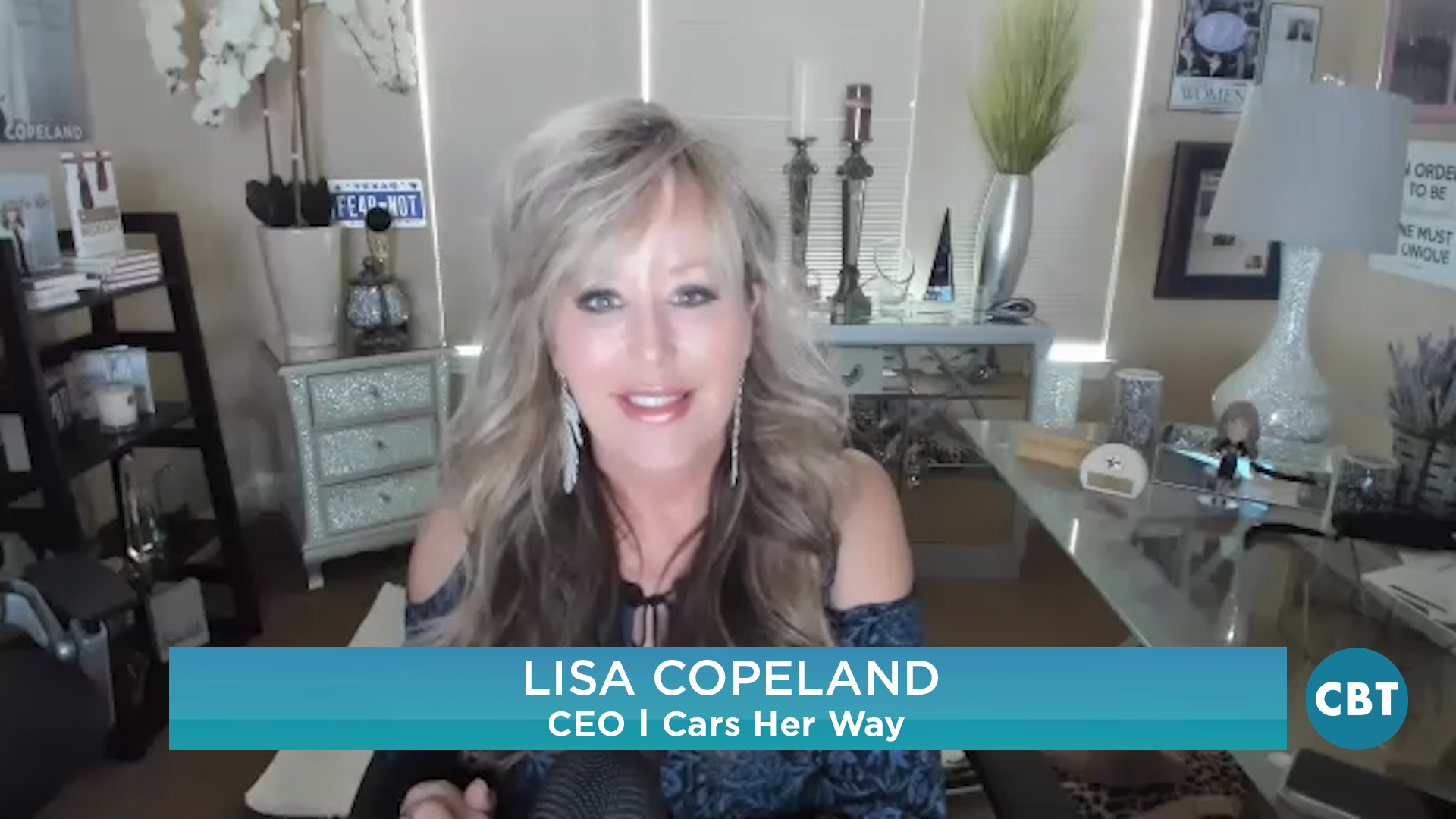By now, we are all aware of the concerns and issues surrounding COVID-19 also known as the CoronaVirus. With many businesses temporarily closing their doors in an effort to practice “social distancing”, many dealerships remain uncertain about what steps they need to take next. Here to lend us her perspective as an auto retailing expert and former high volume dealer is Lisa Copeland. Lisa is the founder of Lisa Copeland Global, CEO of Cars Her Way, and host of the Cars Her Way podcast on iheartradio.
Jim Fitzpatrick: Hi everyone. Jim Fitzpatrick with CBT News. Thanks so much for tuning in today. We are joined by Lisa Copeland, founder of Lisa Copeland Global and CEO of Cars Her Way. Thanks so much for joining us today, Lisa.
Lisa Copeland: Thanks for having me, Jim.
Jim Fitzpatrick: Yeah, we just all got finished listening to the president give a speech, another speech about the Coronavirus and I wanted to get your take on this. Because you’ve run highly successful high volume dealerships in the past and you criss-cross the country speaking to auto groups all the time.
Jim Fitzpatrick: So I want to get your take on some of the questions that dealers have that they’ve written into us to say, “Hey man, we know you got any advice? What do you think we should do here?” And so let’s begin there. If it was Lisa Copeland Automotive Group, what would you be telling your people today?
Lisa Copeland: Well, I just want to open it with the disclaimer that I’m not trying to be an armchair quarterback, right Jim? Because people were like, we’re in it every single day. Who do you think you are?
Jim Fitzpatrick: No, I know. I know.
Lisa Copeland: And so I want to be really mindful of that because I will tell you all of our dealers, our partners, our friends, our colleagues, they’re all in unchartered territory.
Jim Fitzpatrick: Yeah, that’s for sure.
Lisa Copeland: And something that they’ve never been faced with before.
Jim Fitzpatrick: Right. Right.
Lisa Copeland: So, I know the advice I’ve given, but again, I kind of feel like I’m sitting in the cheap seats giving it. So again, I just want to say that.
Jim Fitzpatrick: Having said that, maybe you’re in a unique situation where, because you’re not in the thick of it as many managers are. Because right now they’re walking around like shell shocked, not knowing. So maybe because you’re not in that deepen in the everyday to day running the dealerships that you can kind of step back and look at it a little bit more clear eyed than some of the others. And also from a consumer standpoint, if you’re a consumer out there, what do you want your dealership to be telling you?
Lisa Copeland: So a couple of things. So, number one, I firmly believe in what we’re doing as a country to try to eradicate or at least contain this global pandemic. And it’s scary and I think that the protocol would be different for a dealer in Des Moines, Iowa, if there’s zero COVID cases compared to maybe even sitting in Austin, Texas, where we’d had I think seven now. And I know Atlanta has had some.
Lisa Copeland: But I would also say that I think, what I would tell a dealer and I’ve had plenty call me and I have a private Facebook group of over 3,300 sales professionals.
Jim Fitzpatrick: Yeah, incredible.
Lisa Copeland: Probably 2,500 of those are in the automotive industry. And so I’m in constant communication with them. And I think the thing I would say is if it was Lisa Copeland Automotive today, here in Austin, Texas, at this point, I would not close the doors.
Jim Fitzpatrick: Okay.
Lisa Copeland: There’s a couple of reasons. Number one, our country has to keep moving forward. I would absolutely comply with what the President has asked every citizen in the United States to do. And so therefore I would see some tweaks in my dealership if it was me, okay. So for example, I would send the accounting department home. I think that they can work remotely. and so I think there’s that. So I think the accounting department can go home.
Lisa Copeland: This is super uncharted territory, but potentially if things heat up, maybe possibly the BDC could work from home, right? They could dial in and they could answer leads and whatever. But our salespeople, Jim, I mean, they’ve got to feed their families. We can’t just say we’re shutting our country down for four weeks. And oh hey, by the way, good luck.
Lisa Copeland: And then I had a conversation, it was Sunday, it was yesterday, this dealer, a client of mine called me and she said, so it gives you some kind of hint of who it could be, but she said, “What do we do as a small dealer group? Because we want to support our sales professionals. We want to support our service techs and our writers. We don’t want to lose anybody, but it isn’t like they’re rolling in money either. So, what do we do?”
Lisa Copeland: And I think we’re just going to have to use extreme caution and good judgment. What I do know is that the president has not called for us to close down the car dealerships. You know what they’ve said is I think the number, you watched it too Jim but I think he said no more than 10 people put together now.
Jim Fitzpatrick: Right.
Lisa Copeland: So if we work smart and I’m talking to my friends around the country, Frank Criniti number one or two salesman in the world right now. He was on my show this morning and he said that he personally sold 16 cars this Saturday.
Jim Fitzpatrick: Wow.
Lisa Copeland: So there is an opportunity–
Jim Fitzpatrick: That’s a slow day for Frank.
Lisa Copeland: That’s a slow day for Criniti. Right? So people I think are still moving forward. I think people are still trying to do business because we all know it’s so important. But I think that, I’ve seen a lot of videos come out from dealerships of them cleaning, notices of what they’re doing to protect the consumers to protect their employees. So I think that is super important. So I think if it was Lisa, a long answer to a short question–
Jim Fitzpatrick: No, no, it’s a complex issue, so it kind of requires that.
Lisa Copeland: It is, and so I think to comply, I think I would look at sending home, non-essential personnel that can work from home so that we’re not affecting their incomes.
Jim Fitzpatrick: Right. But you would keep the service drive open with technicians. You keep the showroom open with salespeople and managers, obviously detail shop. If in the event they’ve got to deliver a car, what have you. So the variable ops would pretty much, well I say that, but also fixed ops to.
Lisa Copeland: We have to. Yeah, we have to.
Jim Fitzpatrick: Okay.
Lisa Copeland: I mean at this point in the game. I think we just have to be really, really vigilant about sending people home if they’re sick. I mean, if they’re sick, not having them come to work. And then I’ve had several sales people tell me that they… And then when it comes to people that are commissioned there are some people, Jim, I believe, that are genuinely terrified by what’s going on.
Lisa Copeland: They’re genuinely afraid. They’re afraid to go into public. And I think that those people, I think we don’t chastise them. We’re such a business of chastising people and you’re weak and whatever. And, I think that we have to be really, really cognizant of how people feel.
Jim Fitzpatrick: And compassionate.
Lisa Copeland: And compassionate. If they’re afraid, then send them home, right? Send them home.
Jim Fitzpatrick: So kind of leave it up and not threaten their jobs, but leave it up to the associates to say, “We’re open for business. We’d love everybody to come in. We’ll have plenty of hand sanitizer and such. We’ll obey by the rules of no touching.” And everybody’s got a six foot circle around them and such.
Lisa Copeland: Social distancing.
Jim Fitzpatrick: Right.
Lisa Copeland: And Frank Lopes are our good friend he put a great post up the other day. He said, “It would cost you 30 cents a client. So go ahead and just put a big thing of BIC pens on every desk and service everywhere. So then that way once you grab that pen, Mr customer, that is your pen.”
Jim Fitzpatrick: It’s yours. That’s right.
Lisa Copeland: No one’s ever touched it.
Jim Fitzpatrick: That’s right.
Lisa Copeland: So I think it’s little things like that. I think toilet seat covers, I think that’s important. I had a talk with a dealer. She said, “Do you think I should invest in toilet seat covers? Like the paper ones?” Yep. I think you should invest in anything that gives your employees and your clients a sense of comfort.
Jim Fitzpatrick: What about demo drives? Should salespeople go on demo drives with customers that either they don’t know, obviously or not. I mean, maybe even the customer’s thinking, gee, I’d like to think car for a drive, but I don’t want Bob here to go with me or Susie or whatever. That’s pretty close quarters. I mean, you’re like right here with the person breathing on you, God forbid somebody sneezes.
Lisa Copeland: Yeah. I’m always about someone on demo drives, but I got to tell you right now, I would end that. They’ve even ended things at the airport. Like if people don’t have TSA they’re not taking off their shoes anymore.
Jim Fitzpatrick: Yeah.
Lisa Copeland: So I mean, I think for such a time as this that we have to adapt our policies and so yeah, I would send customers out on their own on test drives. And little things. If I was a sales person, I’d walk out, before I put them in the car, I would wipe down the door handle for them and sanitizing. I’d sanitize the steering wheel. I’d sanitize the key in front of them. Maybe even wear gloves. Why not? It’s about the psyche. Right?
Jim Fitzpatrick: One of the dealers that I was talking to said that they had a little flurry in the service business because a lot of people that were going to be going to visit their parents and grandparents and such and other family members, one guy had to go pick up his daughter from college and he said and there’s no flights to do that.
Jim Fitzpatrick: And plus he did, if there was, he didn’t want to get on a flight, he wanted to take his car, he needed tires before a long trip. He wanted to make sure the car had a tune up and such. So he felt as though that it was worth keeping the service department open for customers like that. That now because of no mass transportation or the minimalizing it people using their cars more now. And therefore they need the service.
Lisa Copeland: They will. And our good friend Brian Benstock, he must’ve predicted this several years ago. I mean picking up and delivering a customer’s car. Right? But showing a customer, you know those hospital things that you can put over your shoes?
Jim Fitzpatrick: Yeah.
Lisa Copeland: You put those over your shoes, you’ve got gloves on, you’re sanitizing it in front of them and just being mindful that people are fearful. But then offering pickup and delivery service for sales, pickup and delivery service. Right? So going above and beyond to satisfy our customers anxiety.
Jim Fitzpatrick: Right. Should we be sending out anything to them and an email or a newsletter or anything?
Lisa Copeland: I think everybody is.
Jim Fitzpatrick: Mentioning these items, these things that you’re doing at the store?
Lisa Copeland: Yes, absolutely. Email. But I am getting them from everybody from Whataburger to Ann Taylor. So, if it was me personally, I would do a video like what Brian Benstock did. It’s excellent.
Jim Fitzpatrick: Oh, that’s a good idea. Yeah.
Lisa Copeland: It’s sitting up on LinkedIn right now. He’s got it out there.
Jim Fitzpatrick: Great idea.
Lisa Copeland: Yep. I’d have it on social. I’d send out a video, like a BombBomb email and I would have it everywhere.
Jim Fitzpatrick: And so now we look at companies like Carvana and Vroom that are delivering cars right to the front door. And this might be the impetus to put dealers into the digital retailing in a big way, right? Somebody says, “Hey, I don’t want to come in but I know the car that I want. Can you deliver that to my front door?” This is assuming by the way, they’re still using phones. And they’re not texting. But to call up the dealership and say, “I’ll buy it and we can do all the paperwork over the phone, check my credit, what have you, but can you leave it in my driveway when you get here and we’ll be done.”
Lisa Copeland: Yeah, no, there’s a couple of things I think we’re going to see happen with all of this. I think we’re going to see dealers get forced to come into the year 2020.
Jim Fitzpatrick: Yeah.
Lisa Copeland: And from an education, which I know you didn’t ask me about, but in school it looks like the schools in Texas are going to be closed the rest of the year.
Jim Fitzpatrick: Yeah. Here too, yeah.
Lisa Copeland: So that being said, and look at the universities. And so that being said, I think we’re going to see how much people really can do online.
Jim Fitzpatrick: That’s right.
Lisa Copeland: And, it reduces the cost of a lot of things for both dealers and for people trying to get a higher education. So this is going to test our resolve as a nation. I do. I think it is, but I think we’re going to come out of the other side of it stronger and-
Jim Fitzpatrick: I agree.
Lisa Copeland: And just more effective in business.
Jim Fitzpatrick: And I will say something else and my wife and I were home all weekend and what do you do when you go through all of the series, TV series you want to catch up on and the movies and what have you. My wife and I are sitting there with our laptops open and excuse me, I’m coughing. So I must have the virus, and we’re shopping the whole time, “Hey, let’s get that a thing that we wanted for the back patio. Let’s get that thing that we wanted for the basement.” And the same holds true for cars, right? People will take this time now that they have plenty of time at home to go ahead and shop online and one of those things will be for automobiles.
Lisa Copeland: Absolutely. And and just like you and I are having a conversation right now over Zoom, salespeople can do the very same thing.
Jim Fitzpatrick: That’s right.
Lisa Copeland: Dealers are going to have to get them a laptop or they’re going to have to get them a computer that’s not 20 years old. They’re going to have to get them a camera.
Jim Fitzpatrick: That’s right.
Lisa Copeland: These conversations could happen right now from the comfort of my living room and your living room. And we could be negotiating a car deal.
Jim Fitzpatrick: That’s right. And as you know, people today will take a nice clear video if you just say, “Hey, take the phone, wrap it around the whole car, show me the inside show me the trunk, let me bring the car back in two or three days. If it’s not exactly the way that you showed it to me or I missed something.” Have a little bit of a liberal return policy and let it fly. Have that virtual showroom and delivery setup that we all talk about.
Lisa Copeland: Yeah. So I think it’s going to be interesting to see the way that dealers are pushed into evolution.
Jim Fitzpatrick: Yeah. That’s right.
Lisa Copeland: And then I also think that it’ll take a little bit of training our customers too, to trust us, to trust the process and to trust the new way to do it. So interesting times, Jim. Interesting times.
Jim Fitzpatrick: They really are. They really are. So leave it up to the employee, whether if they feel like they just don’t want to come in during these times. That’s okay. It’s not going to cost you your job. You can stay home. Otherwise keep things operational with the exception.
Lisa Copeland: As long as we can.
Jim Fitzpatrick: Yeah. The exception of maybe BDC and back office and then just take it day by day. Right?
Lisa Copeland: Yeah. I think if it was me depending on what city you’re in sending some of the nonessential personnel home that can work from home. So the work still gets done and all of that. I mean, I think the more people you can clear out of the building, the better.
Jim Fitzpatrick: Yeah.
Lisa Copeland: But at the end of the day the sales people need to be there, but there’s no reason in the world that a good BDC person can’t sit just like you and I are doing and sit on video and negotiate with leads and customers.
Jim Fitzpatrick: That’s exactly right.
Lisa Copeland: And I almost feel like customers almost might be better with it. They might be like, okay, wow, this is good. Like this dealer is taking this seriously. And I guess I just want to say, there’s some people out there and I’ve seen it in the car business they’re not taking this seriously and they’re making light of it. And that might be okay on internal postings and stuff, but your clients or your customers are watching and it’s really serious to people.
Jim Fitzpatrick: That’s a very good point. Both on the anxiety level as well as real stories. I mean I think there’s 69 people that have already passed away with this. You never know if you’re talking to a relative of somebody that’s actually lost their life on this.
Lisa Copeland: Yeah. I mean that was somebody’s dad, mother, grandparent, child, who knows.
Jim Fitzpatrick: That’s exactly right.
Lisa Copeland: So I just think we have to not all be so lib about this and take it serious. Our President’s taking it serious and our governors and everyone else. So they probably know something we don’t know.
Jim Fitzpatrick: Yeah, that could be.
Lisa Copeland: But I think all of our actions, both when we meet with the client or even on our personal Facebook or online or whatever, need to be, that we are serious about this. We take this threat seriously and we’re going to protect you and the safety of your family, if you will give us the honor of doing business with us.
Jim Fitzpatrick: That’s right. I love it. I love it. Lisa Copeland always has the answers, founder of Lisa Copeland Global and CEO of Cars Her Way, which we want to have you back again to talk about in the future. So thanks so much for joining us here at CBT News to talk about this very, very important issue.
Lisa Copeland: Thank you Jim. I appreciate it.
Jim Fitzpatrick: Thanks.
CBT Automotive Network, the number one most-watched network in retail automotive. This has been a JBF Business Media Production.









